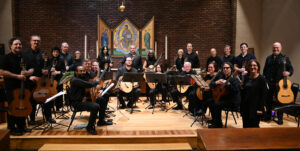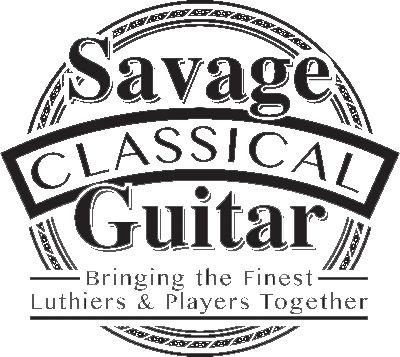by J. Andrew Dickenson
September 2004
“Guitar is only a small part of my musical experience,” says Fabio Zanon, who has been playing since he was nine. “And music is only a small part of what life is and what life means. Everything gets mixed together.”
Most people know Fabio Zanon as the Brazilian guitarist who, in 1996, won two of the most prestigious competitions within a few weeks of each other: the GFA International Competition and the Francisco Tarrega International Competition. He’s since become one of the busiest guitarists on the circuit today, with a schedule that bounces him around the globe to Argentina, United States, Australia, Brazil, and various other international locales. But Zanon is much more than a virtuoso guitarist. He’s a philosopher. He’s a reader. A writer. A conductor. A teacher, a historian, an artist, a naturalist. He’s a sophisticated intellectual who believes that knowledge is never a dangerous thing.
“There’s a certain inner balance that only shows if you’re overall balanced,” Zanon says. “I try to become one with music as much as I can.”
Guitar Is Everywhere
Although Zanon’s education began at the age of three when his older sister would insist on playing school with him, his first training in music came from his father, a guitarist who was a master of the Brazilian Choros and traditional instrumental dance music.
“Guitar is everywhere in Brazil,” says Zanon. “There is a certain stigma that is associated with its popular roots, but in Brazil the prejudice is much weaker.”
Zanon knew from an early age that he wanted to be a musician, but it wasn’t just the sambas that inspired him. His ears grew up listening to records of musicians who had never had the privilege of standing on Brazil’s gorgeous shores: Mozart, Beethoven, and famous Italian operas. It was the magic of these masters that spellbound Zanon.
“From the age of 10, I couldn’t think of anything except classical music,” Zanon says. “I wanted to play the piano, but my father was a guitarist and he told me learn it first. For this reason, I always say that I chose music, but the guitar chose me.”
For a long time, Zanon says, he fought the guitar, trying to coax the sounds of a piano or a string quartet from the six strings. Eventually he came to enjoy the guitar “on its own terms” and has become a leading authority on the works of one of the most significant composers for guitar, Villa-Lobos.
Old School
“I’m a strong believer in old fashion education,” says Zanon. “Books have always been my haven — I spend all my spare time reading. Read Dante and Sartre. Don’t just see the latest action movie. If you’re going to watch movies, then watch Cary Grant — especially if you want to play elegantly.”
Although he says that his formal education was completed in “a very disorganized way,” Zanon is well-versed in literature, is a collector of visual art, listens to orchestral musicians and piano, and reads constantly. He strongly advocates having a well-rounded life and learning how other interests can complement and better one’s guitar playing.
“Someone’s vibrato can be much improved by watching the wind blow the leaves,” Zanon elucidates, “or by looking at a beautiful landscape where everything is put together well. I enjoy meeting people and having thoughtful conversations. I try to have an all-encompassing experience of life.”
To play well, “one must develop one’s own character and we must cultivate it every day. Otherwise, classical music doesn’t blossom — the food is not nurturing. We must choose between what is blatantly commercial and what is really life-enhancing. Any classical author is worth reading. Any art exhibit is worth seeing. What is not worth doing is eating Big Macs — that doesn’t develop anyone’s sense of aesthetics at all.”
Zanon is quiet for a moment as he reflects on the commercial society we live in.
“Although,” he laughs, “once a year I do have to go to McDonald’s for several reasons!”









